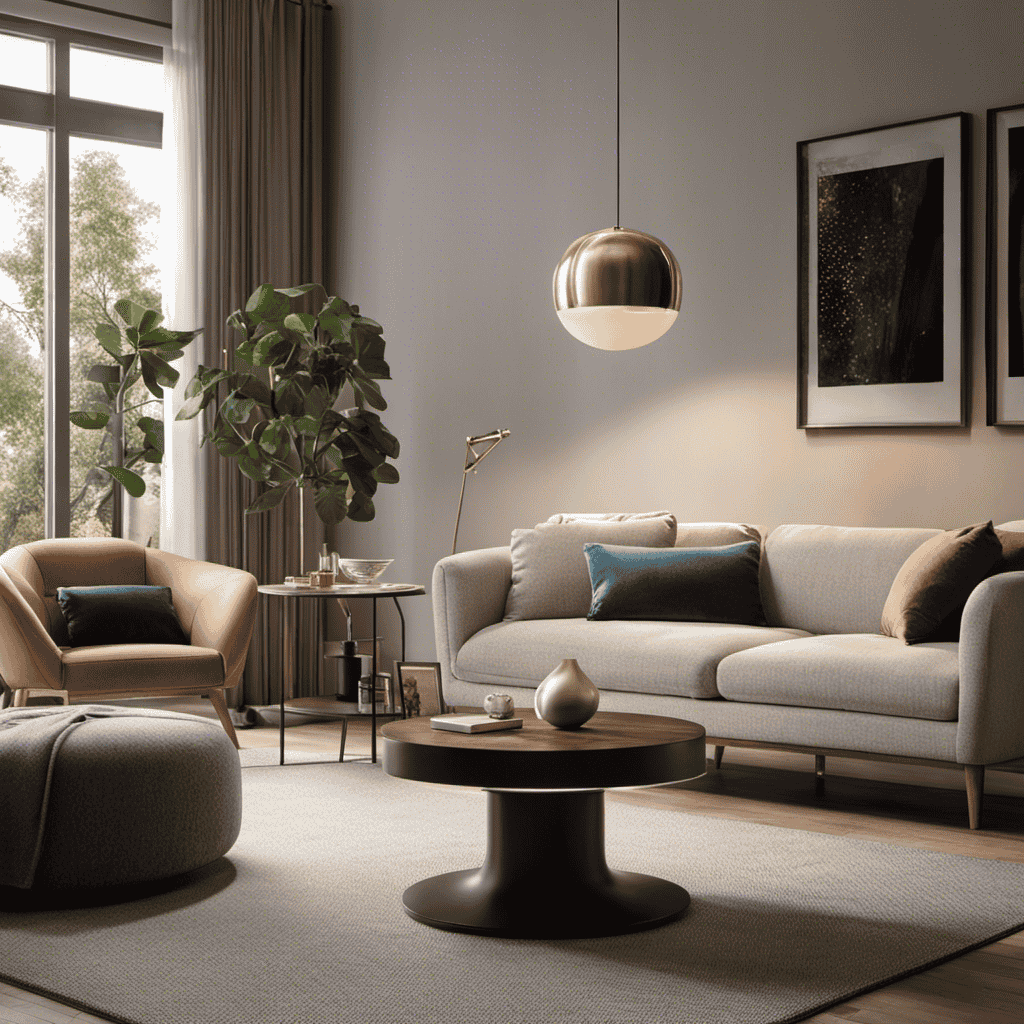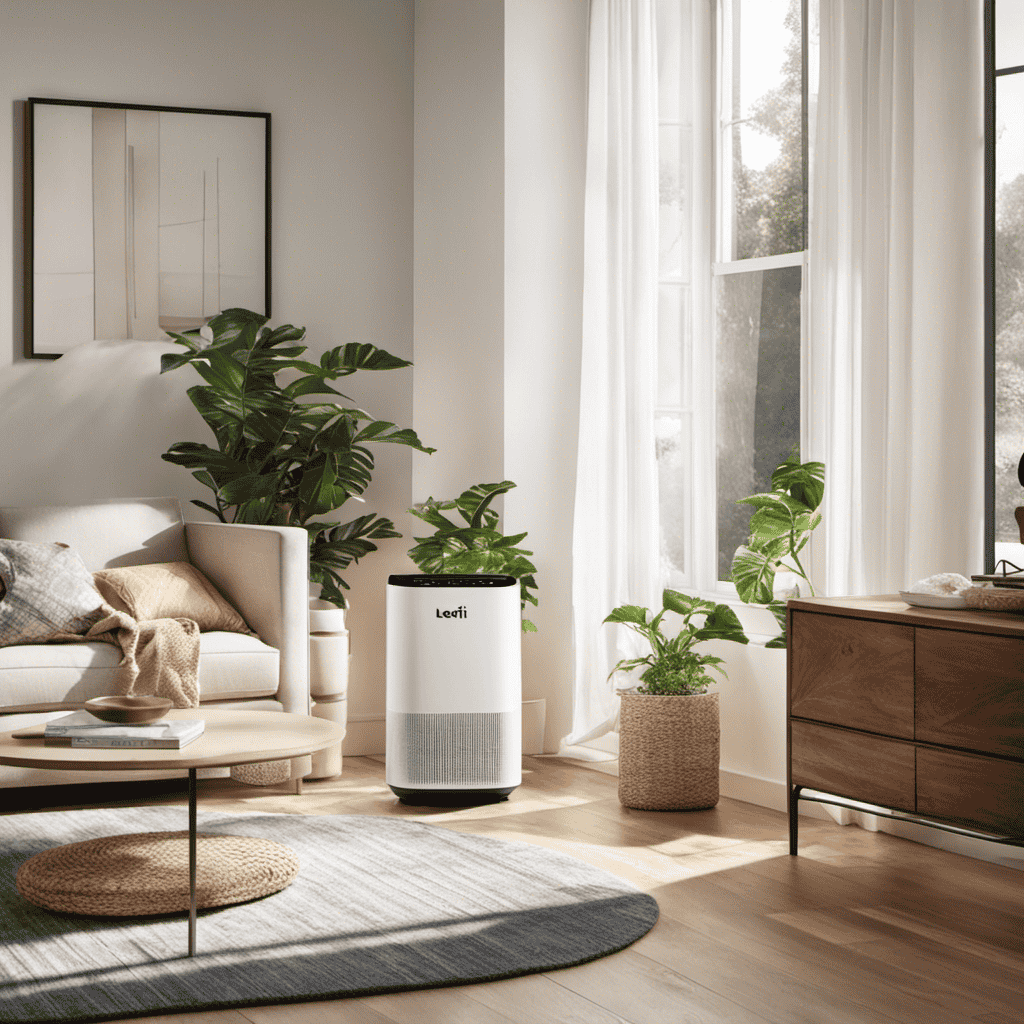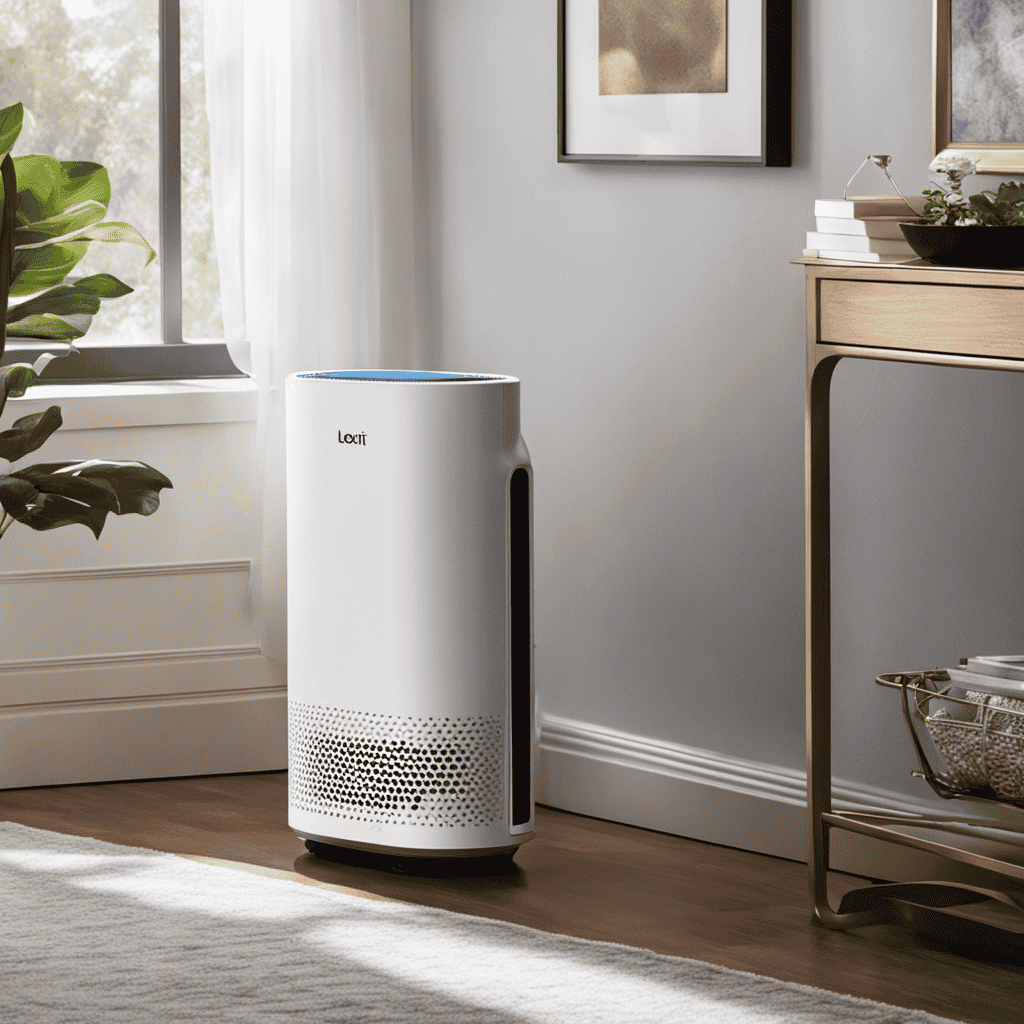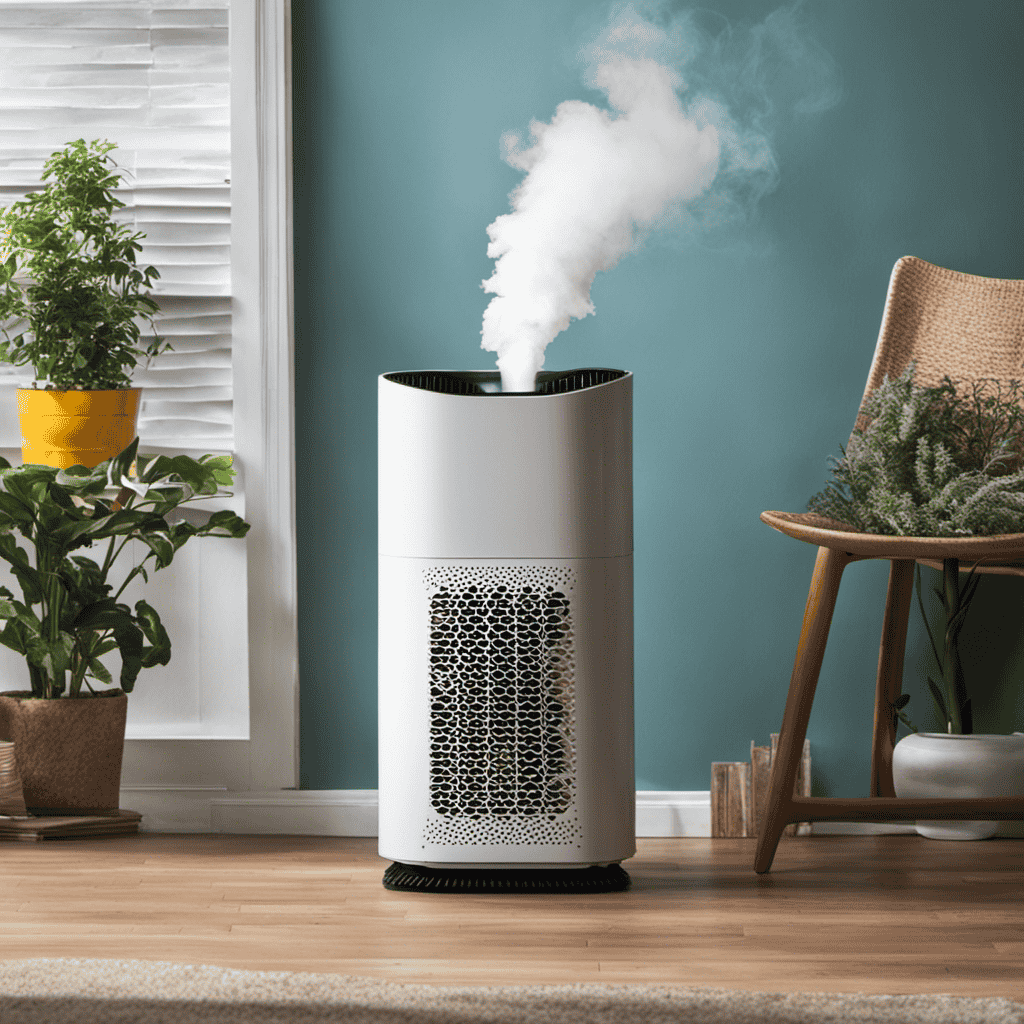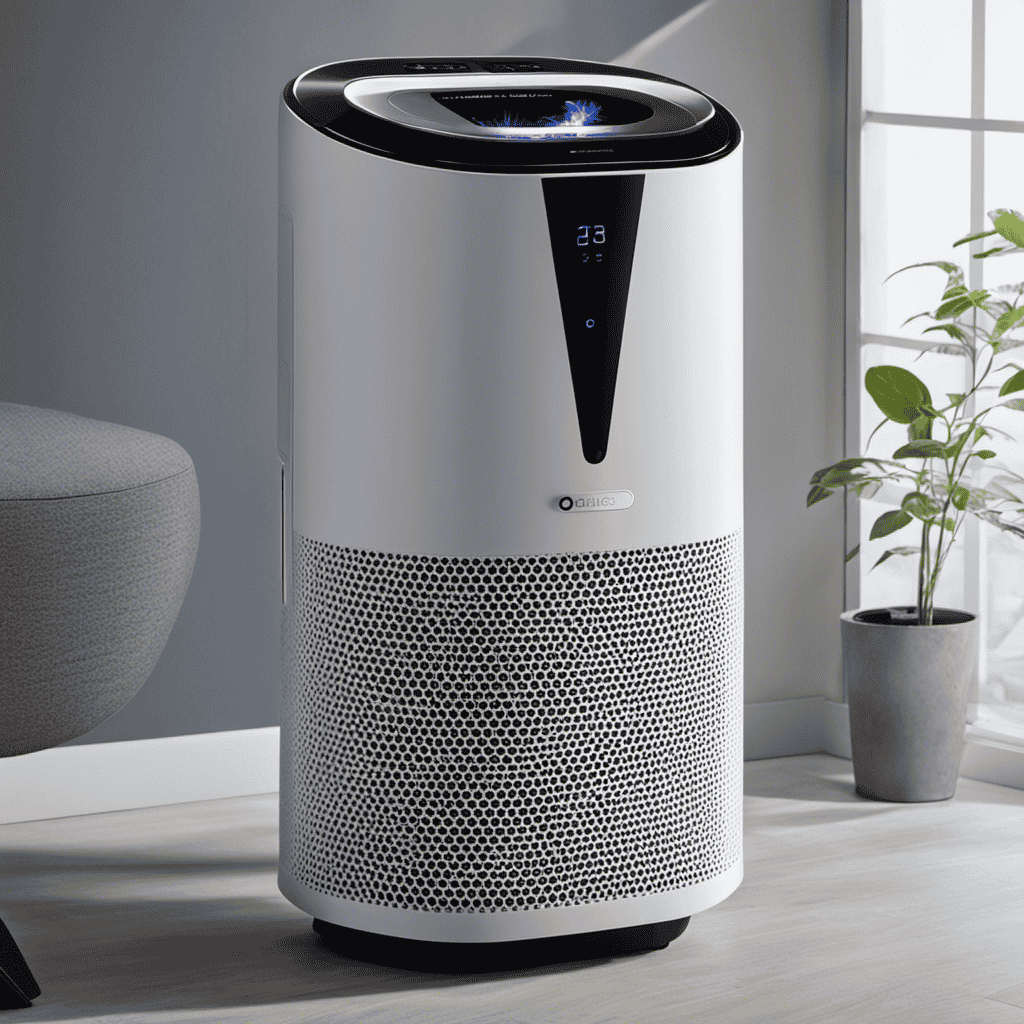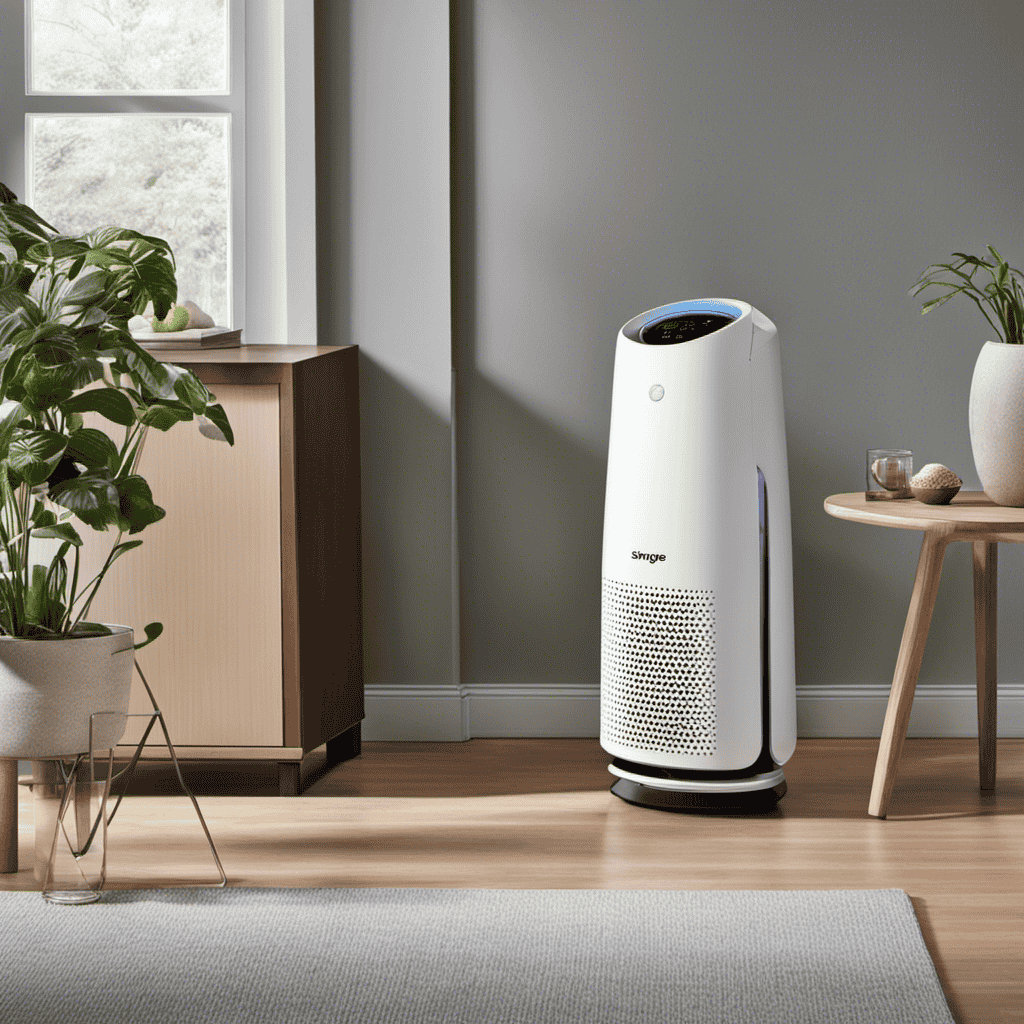I have always been curious about how long I should run my air purifier to ensure that the air in my home is clean and healthy. After doing extensive research and considering different factors, I have put together a detailed guide on figuring out the best amount of time to use an air purifier.
From room size to air quality levels, this article will provide evidence-based recommendations to help you set the right timer for your air purifier.
So, let’s dive in and discover the best practices for efficient and effective air purifier use.
Key Takeaways
- Assess air quality using a portable monitor and consider room size when determining the optimal duration for air purifier usage.
- Factors such as pollution levels and the air purifier’s Clean Air Delivery Rate (CADR) should be taken into account when adjusting the duration of air purifier usage.
- Smaller rooms benefit from smaller air purifiers, while larger rooms may require more powerful units for optimal performance.
- Regular monitoring of indoor air quality is important for identifying potential sources of pollution and maintaining clean and healthy air.
Determining the Optimal Duration
Determining the optimal duration for having the air purifier on can be a bit challenging.
As someone who suffers from allergies, I understand the importance of finding the right balance.
To determine the optimal purifier settings, it is crucial to consider factors such as the size of the room, the level of pollution, and individual sensitivities.
Allergies play a significant role in this equation.
Adjusting the air purifier for allergies involves monitoring symptoms and observing how they improve or worsen with different settings.
It is recommended to start with a lower setting and gradually increase if needed.
Monitoring air quality using a particle counter can also help in determining when to turn the purifier on or off.
Ultimately, finding the optimal duration is a personal journey that requires experimentation and attention to one’s specific needs.
Factors to Consider for Air Purifier Usage
When it comes to using an air purifier, there are several factors to consider for optimal usage.
First, determining the optimal duration is crucial in order to achieve the desired air quality improvement.
Secondly, the size of the room where the air purifier is being used can have a significant impact on its effectiveness.
Lastly, understanding how an air purifier can improve air quality is essential for making informed decisions about its usage.
Optimal Usage Duration
To get the most out of your air purifier, it’s important to know the optimal duration for usage. Determining the effectiveness of an air purifier depends on several factors, including the size of the room, the types of pollutants present, and the air purifier’s Clean Air Delivery Rate (CADR). Adjusting for seasonal factors is also crucial, as air quality can vary throughout the year.
Here are some guidelines to help you determine the optimal usage duration for your air purifier:
-
Assess the air quality in your home: Use a portable air quality monitor to measure the levels of pollutants in different rooms.
-
Consider the size of the room: Smaller rooms may require less time for purification, while larger spaces may need longer periods.
-
Take into account seasonal factors: During allergy seasons or periods of high pollution, running the air purifier for longer durations may be necessary.
Room Size Impact
The impact of room size on the effectiveness of your air purifier can vary. When it comes to monitoring air pollution and selecting the right air purifier, room size plays a crucial role.
A smaller room may benefit from a smaller air purifier, while larger rooms may require a more powerful unit. This is because the size of the room directly affects the air circulation and purification process.
In a smaller room, the air purifier can effectively clean the air and remove pollutants. However, in a larger room, a smaller air purifier may struggle to cover the entire space and provide the same level of purification.
Therefore, it is important to consider the size of your room when selecting an air purifier to ensure optimal performance and effectiveness in eliminating air pollutants.
Air Quality Improvement
You can improve the quality of your indoor environment by considering factors such as ventilation, humidity levels, and the use of plants. When it comes to improving air quality, one effective option is using air purifiers. Air purifiers work by removing pollutants and allergens from the air, helping to reduce the risk of respiratory issues and allergies.
Here are some benefits of using air purifiers:
-
Removes airborne pollutants: Air purifiers can filter out common pollutants such as dust, pet dander, pollen, and mold spores, improving the overall air quality in your home.
-
Reduces odors: Air purifiers with activated carbon filters can help eliminate unpleasant odors caused by cooking, pets, and smoke.
-
Improves sleep quality: By removing airborne particles that can cause irritation and disrupt sleep, air purifiers can contribute to a better night’s rest.
Investing in an air purifier can provide long-term benefits for your health and well-being.
Setting the Right Timer for Your Air Purifier
Make sure you’re setting the right timer for your air purifier to ensure optimal air quality in your home.
The optimal timer settings for an air purifier depend on various factors, including the size of the room and the level of air pollution.
It is recommended to run the air purifier continuously in areas with high pollution levels, such as near busy roads or industrial areas.
In general, running the air purifier for at least 8 hours a day is considered beneficial for maintaining good air quality.
However, it is important to note that the effectiveness of an air purifier is not solely dependent on the duration of operation.
Regular maintenance and filter replacement are also crucial for optimal performance.
Recommended On Times for Different Room Sizes
To ensure optimal air quality, it’s recommended to set different on times for air purifiers based on the size of the room. This is because the air purifier needs sufficient time to circulate and filter the air effectively.
For small apartments, it’s advisable to run the air purifier for at least 6-8 hours a day. This duration allows the purifier to continuously clean the air and maintain a healthy environment.
On the other hand, determining the ideal duration for large bedrooms requires considering factors such as the level of air pollution and the number of occupants. In general, running the air purifier for 10-12 hours a day should provide adequate purification for larger spaces. However, it’s always best to refer to the manufacturer’s recommendations and adjust the on times accordingly.
Understanding Air Quality Levels and Purifier Usage
When it comes to air purifiers, understanding the optimal running time is crucial. Factors such as room size, air quality levels, and the effectiveness of the purifier can all affect how long it should be used.
Monitoring indoor air quality is essential to determine the effectiveness of the purifier and make adjustments as needed.
Optimal Purifier Running Time
The optimal running time for an air purifier is typically determined by the size of the space and the air quality needs. It is important to consider the effectiveness of the purifier in cleaning the air and the cost of running it.
Determining the effectiveness:
- Evaluate the CADR (Clean Air Delivery Rate) of the purifier to understand how quickly it can clean the air in the given space.
- Consider the presence of specific pollutants, such as allergens, smoke, or pet dander, and choose a purifier with appropriate filters to target those pollutants.
- Monitor the air quality using sensors or air quality monitors to determine the effectiveness of the purifier.
Cost considerations:
- Look for energy-efficient models that consume less electricity, reducing the cost of running the purifier.
- Consider the cost of replacement filters and factor that into the overall cost of using the purifier.
- Compare the prices of different purifiers and choose one that offers good performance within your budget.
Monitoring Indoor Air Quality
Monitoring indoor air quality can help ensure clean and healthy air in your space. Regular monitoring allows you to identify and address any potential air pollution sources, leading to improved health and well-being. Clean air is essential for respiratory health, as exposure to pollutants can lead to various health issues, such as asthma, allergies, and even cardiovascular problems. By monitoring air pollution levels, you can take proactive measures to reduce pollutants and create a healthier environment. Here is a table that highlights the health benefits of clean air:
| Health Benefits of Clean Air |
|---|
| Reduced respiratory illnesses |
| Improved lung function |
| Enhanced overall well-being |
Regular monitoring and maintenance of indoor air quality can have a positive impact on your health and the health of those around you.
Factors Affecting Purifier Effectiveness
Factors affecting purifier effectiveness can include room size, air circulation, and the presence of potential pollutants. To determine the effectiveness of an air purifier, it is important to consider these factors:
-
Room size: The size of the room plays a crucial role in determining the purifier’s effectiveness. A purifier with a lower Clean Air Delivery Rate (CADR) may not be suitable for larger rooms as it may not be able to clean the air effectively.
-
Air circulation: Proper air circulation is essential for the purifier to work efficiently. Placing the purifier in a central location can help ensure that the purified air is distributed evenly throughout the room.
-
Presence of potential pollutants: Different purifiers are designed to target specific pollutants such as dust, pollen, pet dander, or smoke. Understanding the type of pollutants present in your environment can help you choose the right purifier for maximum effectiveness.
Considering these factors can help determine the effectiveness of an air purifier and optimize its usage.
Now, let’s delve into the question of how long you should leave the air purifier on at night.
How Long Should I Leave the Air Purifier on at Night
To maximize air purification while sleeping, it’s important to determine how long you should leave the air purifier on at night. Setting the right timer can ensure that you are breathing in clean and healthy air throughout the night. The optimal duration for running an air purifier depends on various factors such as room size, air quality, and the specific model of the purifier. It is recommended to refer to the manufacturer’s guidelines for specific recommendations. However, as a general rule of thumb, running the air purifier for 8-10 hours at night should be sufficient to achieve effective air purification. It’s also important to consider noise levels and energy consumption when deciding on the duration. A table below summarizes some factors to consider when determining the optimal duration:
| Factors to Consider | Recommended Duration |
|---|---|
| Room Size | Larger rooms may require longer durations |
| Air Quality | Poor air quality may require longer durations |
| Purifier Model | High-performance models may require shorter durations |
| Noise Levels | Consider noise levels during sleeping hours |
Remember to adjust the duration based on your specific needs and preferences.
Adjusting Air Purifier Duration for Seasonal Factors
When it comes to adjusting air purifier settings, it’s important to consider seasonal factors, especially for those of us who suffer from seasonal allergies. As someone who deals with this issue, I have found that making changes to the duration of air purifier usage can be beneficial.
Here are a few things to keep in mind:
-
Pollen levels: During the spring and summer months, pollen counts tend to be higher. Adjusting the air purifier to run for longer periods can help filter out these allergens.
-
Mold spores: Fall and winter are prime times for mold growth. By extending the duration of air purifier usage, you can effectively reduce the presence of mold spores in your home.
-
Dust mites: These microscopic creatures can trigger allergies all year round. Running the air purifier for an extended time can help keep dust mites at bay.
Tips for Efficient Air Purifier Use
Consider these tips to maximize the efficiency of your air purifier usage.
To ensure energy efficiency, it’s recommended to use a timer on your air purifier. Set the timer to run the device only when you are present in the room or at times when the air quality is likely to be worse, such as during cooking or cleaning activities.
By utilizing a timer, you can reduce unnecessary energy consumption and prolong the lifespan of your air purifier.
Additionally, it’s important to regularly clean and replace the filters as instructed by the manufacturer. Clogged filters can impede the airflow and reduce the effectiveness of the purifier.
Following these energy efficiency tips and recommended timer settings will help you optimize the performance of your air purifier.
Does the Duration of Using an Air Purifier Affect How Soon I Can See Its Effects?
The effects of air purifier timeline can vary depending on factors like room size, air quality, and the purifier itself. Typically, you may start to notice improvements in air quality within a few days to a few weeks of using an air purifier consistently. Regular use ensures continued effectiveness.
Frequently Asked Questions
Can I Leave My Air Purifier on All Day?
I can leave my air purifier on all day, but it’s important to consider the energy consumption. It’s best to run it during times when I’m at home and the air quality is the poorest.
Can Using an Air Purifier for Too Long Be Harmful?
Using an air purifier for excessively long periods may have potential risks and negative health effects. It’s important to strike a balance between clean air and not overexposing yourself to the purifier’s ozone or noise pollution.
Should I Turn off My Air Purifier When I Leave the House?
I usually turn off my air purifier when I leave the house to save energy. However, leaving it on can help maintain air quality and reduce allergens. It’s best to consider the trade-off between energy consumption and air purification effectiveness.
Is It Necessary to Adjust the Air Purifier Duration Based on the Number of People in the Room?
It is important to consider the number of people in the room when determining the duration for using an air purifier. Factors like air purifier efficiency and room size can affect its effectiveness.
Can I Use Multiple Air Purifiers in the Same Room for Better Results?
Using multiple air purifiers in the same room can provide better results by increasing the coverage area and improving air circulation. However, it may also lead to increased noise levels and higher energy consumption.
Conclusion
In conclusion, it is essential to determine the optimal duration for running your air purifier based on factors such as room size, air quality levels, and seasonal factors.
While some may argue that leaving the air purifier on all the time is unnecessary, scientific evidence shows that continuous usage can effectively maintain clean air and improve overall health.
By setting the right timer and following recommended on times, you can ensure efficient and effective air purification in your home.
Don’t let doubts hold you back from enjoying the benefits of clean and fresh air!
